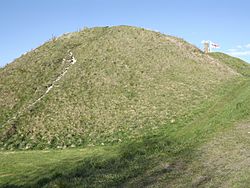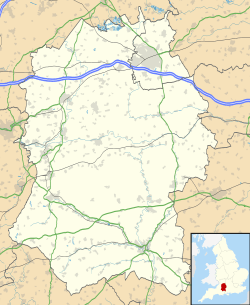Castle Hill, Mere facts for kids
Quick facts for kids Castle Hill |
|
|---|---|
| Mere, Wiltshire, England | |

Mere Castle
|
|
| Coordinates | 51°05′28″N 2°16′22″W / 51.091°N 2.2728°W |
| Type | Enclosure |
| Site information | |
| Owner | Duchy of Cornwall |
| Open to the public |
Yes |
| Condition | Only earthworks remain |
Castle Hill, also known as Mere Castle, was a strong medieval castle built in 1253. It was constructed by a very rich man named Richard, who was the Earl of Cornwall. This means he was a powerful noble in charge of a large area. The castle stood on a hill, looking over the town of Mere in Wiltshire, England.
Mere Castle was made of stone and had six towers. It also had inner buildings and strong gates. However, by the 1300s, people stopped using the castle. Its stone and metal were taken away to be used elsewhere. Today, only the earthworks, which are the shapes of the castle left in the ground, can be seen.
Contents
Mere Castle: A Look Back in Time
Building a New Castle
In the early 1200s, the village of Mere was quite small. In 1243, Richard, the Earl of Cornwall, bought the land. Richard was the brother of King Henry III and had a lot of money. In 1253, he decided to build a castle at Mere.
The castle was built on a chalk ridge called Long Hill. The top of the hill was flattened to make space for the castle. A deep ditch, about 5 meters (16 feet) deep, was dug on the west side. Records show the castle was a rectangular stone building. It had six towers, a main hall, and two gates. There was also a deep well and a chapel inside. It might have looked like a smaller version of Framlingham Castle. People likely entered the castle from the west side. At the same time, the village of Mere grew into a planned town with a market. The castle was updated in 1300, perhaps because there was a risk of trouble in England.
Why the Castle Was Left Behind
After Richard died, his son Edmund took over the castle. But when Edmund passed away, the castle went back to the King. King Edward II then gave it to his friend, Piers Gaveston. Later, in 1327, King Edward III's second son, John, became the new Earl of Cornwall and owned the castle. Eventually, King Edward III got the castle back. It then became a permanent part of the Duchy of Cornwall, which is a special estate owned by the British royal family.
However, during the 1300s, the castle started to fall apart and was no longer used. In 1398, King Richard II had the lead taken from the castle roofs. This lead was then used for Portchester Castle. By 1660, it seems all the stone from Mere Castle had been removed. People in the 1700s believed the stone was used to build houses in the town below. The town of Mere became successful from trading wool and later linen.
Mere Castle Today
Today, the castle site is a scheduled monument. This means it is protected by law because it is an important historical place. The Duchy of Cornwall still owns the land. It is rented out to the local town council. You can find a flagpole there, which lights up at night. There is also a memorial to the 43rd (Wessex) Infantry Division, a military group. A special ceremony is held at the castle site every Easter.
Finding Out More About the Castle
Archaeologists looked for clues at the castle site in 1887. This work was done by T. H. Baker and C. N. Wyld. Sadly, most of the information they found was lost.
Images for kids
-
A memorial at Castle Hill in Mere, honoring the 43rd (Wessex) Infantry Division.
 | Calvin Brent |
 | Walter T. Bailey |
 | Martha Cassell Thompson |
 | Alberta Jeannette Cassell |




